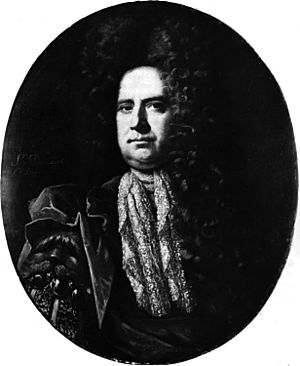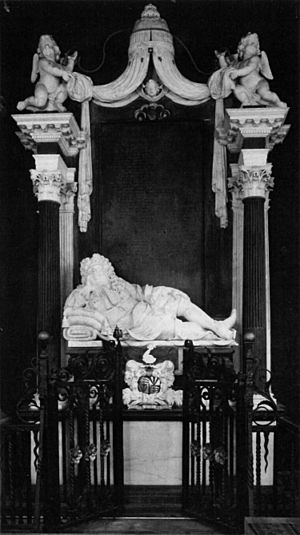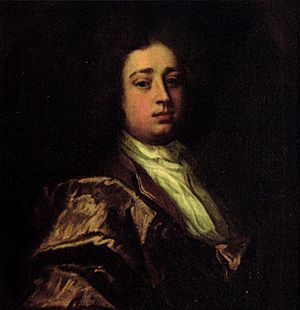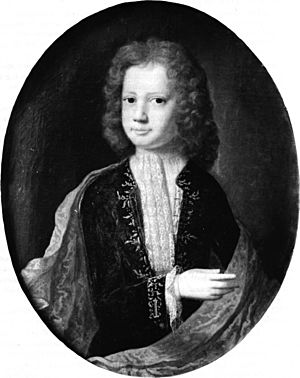Sir Donough O'Brien, 1st Baronet facts for kids
Quick facts for kids
Sir Donough O'Brien
|
|
|---|---|
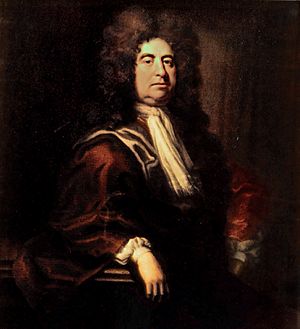
Portrait of Donough which hangs in Dromoland Castle.
|
|
| Born | 1642 |
| Died | 17 November 1717 |
| Spouse(s) |
|
| Children | Lucius O'Brien Honora O'Brien Elizabeth O'Brien Henry O'Brien |
| Parents |
|
| Signature | |
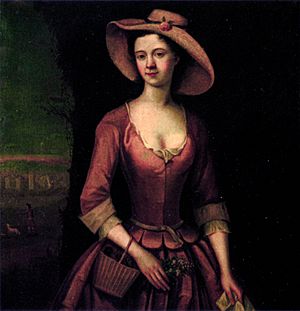
Sir Donough O'Brien (born 1642 – died 17 November 1717) was an important Irish politician. He was also known as the 1st Baronet of Leameneh.
Donough was the son of Conor O'Brien and Máire Rua McMahon. He was the first in his family to join the official Protestant church of the time. He was very smart and careful. He managed to stay neutral during the conflict between King James II and King William III. Because of his clever choices, he became known as the richest commoner in Ireland.
Donough's oldest son, Lucius, passed away before him. So, when Donough died, his grandson, Edward O'Brien, became the next Baronet.
Contents
Early Life and Family
Donough O'Brien was born in 1642 at Leamaneh Castle. His father, Conor O'Brien, was a military leader. His mother was Máire Rua McMahon. When Donough was only nine years old, his father died in battle in 1651.
His mother, Máire Rua, worked hard to make sure Donough would inherit their family land. She later married a soldier named John Cooper. This marriage helped protect their family's property.
Education and First Marriage
When Donough was a teenager, he went to London to study law. This was possible thanks to his stepfather, John Cooper. After his studies, Donough returned to Ireland.
In 1674, Donough married Lucia Hamilton. She was the daughter of Sir George Hamilton. Lucia and Donough had a son named Lucius in 1675. Sadly, Lucia died just two years after they were married.
Second Marriage and Children
A year later, in 1677, Donough married Elizabeth Deane. She was the daughter of Major Joseph Deane. With Elizabeth, Donough had a son named Henry and two daughters, Honora and Elizabeth.
Elizabeth also passed away after six years, in 1684. Donough never remarried after her death. His oldest daughter, Honora, died in 1685 from smallpox. His mother, Máire Rua, died in 1686. His younger daughter, Elizabeth, died at age 18 in 1697. This left Donough with only his two sons, Lucius and Henry.
Dromoland Castle and Public Service
Dromoland Castle was a very old family property. It had been given to Donough's ancestor in 1543. Over time, it became property of the Crown. Donough's father had tried to get it back.
In 1684, Donough successfully gained ownership of Dromoland Castle. It has remained with the O'Brien family ever since.
Political Role and Baronetcy
In 1686, King James II made Donough a Baronet. This was a special title, even though Donough was a Protestant and King James was Catholic.
Donough was very clever during the Williamite War in Ireland. This was a big conflict between King James II and King William III. Donough did not openly support either side. Because of this, he avoided any trouble. He even led a small group of about 20 soldiers to protect himself and his neighbors. In 1690, he was made High Sheriff of Clare.
In 1692, Donough became a member of the Irish House of Commons. This was like being a member of parliament. He represented County Clare until 1714.
Family Marriages
Donough's son, Henry, married Susannah Stafford. She was an heiress, meaning she inherited land and wealth. Henry kept this marriage a secret from his father at first.
In 1701, Donough arranged for his eldest son, Lucius, to marry Catherine Keightley. Catherine's uncle was related to Queen Anne. This was a very important marriage for the family.
In 1711, Queen Anne appointed Donough to the Irish Privy Council. This was a group of important advisors to the monarch.
Later Years and Passing
Donough's oldest son, Lucius, died in 1717. Donough himself passed away later that same year, on 17 November 1717. His grandson, Edward, then became the next Baronet.
Donough was buried at Kilnasoolagh Church. A beautiful marble monument was built there by his son Henry. The monument describes Donough as a noble and kind man. It says he was a loving father, grandfather, and husband. It also mentions his work to improve roads and bridges. He was known for his charity and strong religious beliefs.
Children
Donough had children with both of his wives:
- With Lucia Hamilton:
- Lucius O'Brien (1675-1717)
- Brian O'Brien (1677-1735)
- With Elizabeth Deane:
- Honora O'Brien (1678-1685)
- Elizabeth O'Brien (1679-1697)
- Henry O'Brien (later Stafford O'Brien) (1680-1723)
 | Leon Lynch |
 | Milton P. Webster |
 | Ferdinand Smith |


